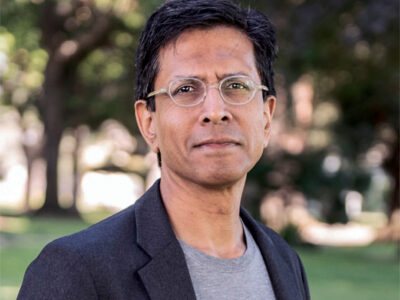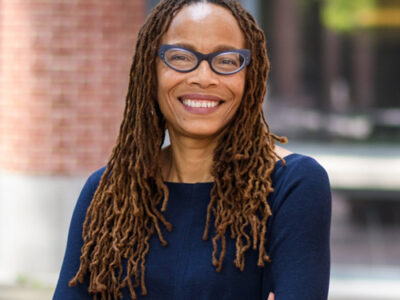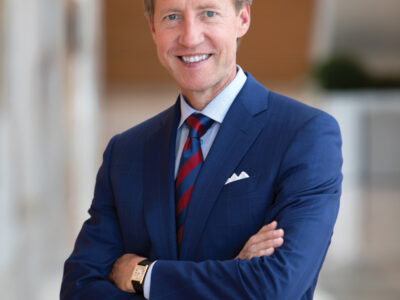Penn’s faculty forms the core of a great teaching and research community.
By Amy Gutmann
My next three columns will explore how our Making History campaign will boost three signature Penn strengths: our path-breaking teacher-scholars; our passionately engaged students; and our connected and dynamic urban campus. I begin with our faculty because our eminent teacher-scholars form the core of a great teaching and research community that spans our 12 schools, six resource centers, and academic health-care system.
In ancient Greece, citizens joined together to forge a community’s intellectual, cultural, and civic identity. Our far more diverse Penn faculty embody this ideal of engaged citizenship by conducting cutting-edge research, sparking inquiry in the classroom, collaborating across disciplines to address the most critical issues of our time, and working creatively together to strengthen the University’s academic and cultural life. These great teacher-mentors inspire our students to dig deeper and reach farther than they ever imagined possible toward realizing their own potential.
You can find an extraordinary range of engaged faculty citizens at all of Penn’s schools—both inside and outside the classroom. Increasingly, Penn faculty are traversing the traditional boundaries of departments and schools, collaborating together with faculty colleagues and students in unlocking the mysteries of the human mind and pursuing answers to the most challenging questions that know no disciplinary boundaries. First and foremost, our faculty members are strengthening the dynamic, interdisciplinary culture that distinguishes Penn among our peers. They are making our campus an irresistible magnet for students with the greatest potential and passion to make the biggest difference in our society and on the world.
For example, John Jackson Jr. might be conversing with students over dinner at the Center for Africana Studies or joining colleagues in designing a new concentration in modern anthropology. A documentary filmmaker, path-breaking humanist, and Penn’s Richard Perry University Associate Professor of Communications and Anthropology, John has captivated undergraduates with his interdisciplinary explorations of modern culture since arriving in 2006 as our first Penn Integrates Knowledge professor. His classes on anthropology in the media and ethnography in cinema fill up quickly with students from multiple schools. John finds that teaching in two schools “awakens new possibilities for understanding the kind of questions that need to be asked—questions you simply can’t answer unless you take an interdisciplinary approach.”
Dawn Bonnell leads investigators from 10 departments as director of Penn’s cutting-edge Nano/Bio Interface Center. As Penn’s Trustee Term Professor of Materials Science and Engineering, Dawn also is committed to increasing students’ participation in science. She spearheaded the creation of an undergraduate nanotechnology minor that exposes students from all schools to this hot field that soon may transform most aspects of our lives. A former student describes her as “one of the most passionate teachers I’ve ever had.” Dawn also is a powerful force for broadening the pipeline of talented students in science and engineering. She teaches a summer nanotechnology course for high-school students, sponsors a “Nano Day” for high-school science classes, and works with Philadelphia teachers to strengthen science and math education.
Some of the greatest teachers translate practical experience into stimulating learning opportunities. Wharton’s vice dean for undergraduate education, Georgette Phillips, is an attorney who models a mutually reinforcing flow among practice, teaching, and research on pressing issues. Her latest work examines what can happen when local governments act like private landowners and attempt to bar non-citizens from their towns, which occurred when some residents of New Orleans tried to relocate after Hurricane Katrina. She explores these issues in the classroom, where, as the David B. Ford Professor of Real Estate and Professor of Legal Studies and Law, she has earned awards for her teaching.
Georgette is making an equally strong impact as a mentor. One alumnus who is now a law student credits her with piquing his interest in real estate law and recently sent her his paper on fair housing that was published in a major law journal. She is advising another student on making the transition from law practice to law teaching. Many of her former students with thriving careers still maintain close contact with her. Georgette’s recent appointment as vice dean for the Undergraduate Division will allow more students to benefit from her dedication and expertise.
While keeping the College of Arts and Sciences at the forefront of innovative teaching and curriculum development, Dean Dennis DeTurck is also much beloved by his math students. His schedule is filled with visits from students who want to talk about a concept from class, lunch dates with his student advisory board, and informal evening chat sessions. A superb mathematical theorist, he trained and deployed a group of student math advisors in the College Houses, where they were on call in the evenings to help fellow students. That initiative helped to create the culture of 24/7 academic support and enrichment that flourishes in the College Houses today. Nearly a decade ago, Dennis was the inaugural instructor for a Center for Community Partnerships academically based service learning course in which Penn undergraduates helped to teach math to West Philadelphia high-school students. The course now is being replicated across the United States.
As dean of the College, Dennis recently led the implementation of its new interdisciplinary curriculum, and is working intensively with faculty colleagues to shape further innovations—while a new cohort of freshman calculus students come under his intellectually stimulating spell.
Eminent scholars and extraordinary teachers like John, Dawn, Georgette, and Dennis are helping to transform Penn students, our society, and our world. Recruiting and retaining such superb faculty members, particularly in an increasingly competitive market, requires both resources for first-rate teaching and research facilities, and resources for publicly recognizing our faculty’s eminence through endowed professorships, with honorific names bestowed by their generous donors.
At Penn and throughout the academic world in which we compete, endowed named professorships symbolize excellence in scholarship and teaching while also furnishing a permanent source of research funding and salary support. Support for first-rate interdisciplinary centers and institutes—as far ranging in their teaching and research missions as our Center for Africana Studies, our Nano/Bio Interface Center, and our Global Leadership Institute—also enables us to leverage Penn’s interdisciplinary competitive advantage in attracting the best scholars and in creating the distinctively high-impact, collaborative culture that attracts the best students to Penn.
When leading lights thrive at Penn and flock to Penn, the world learns that this is the place to be. We have built an enviable community of great faculty citizens that fuels a dynamically collaborative research and teaching culture. We have created this community with an endowment that covers only 11 percent of the salaries of our standing faculty members. Imagine how much we could do with more.
Over the course of the campaign, we will increase our endowment for faculty support while improving our faculty-student ratio, we will build new research and teaching facilities, and endow more of our first-rate research and teaching centers and institutes.
In Periclean Athens, the convergence of creativity, freedom of thought, and intellectual kinship produced advances in philosophy, medicine, government, the arts, and higher education 2,400 years ago that touch our lives today. At Penn our eminent faculty citizens not only push the boundaries of knowledge while guiding students toward lives of discovery, accomplishment, and service; they also are inspiring great future leaders who will be guided by the same eternal educational ideals acquired at Penn.
By enabling us to recruit and retain the most eminent scholar-teachers who are noble exemplars of University citizenship, our Making History campaign will do more than support Penn’s growth; it will also powerfully position us to move our civilization forward.
This is the first in a series of columns on the goals of Making History: The Campaign for Penn, the University’s ongoing five-year, $3.5 billion fundraising effort.




